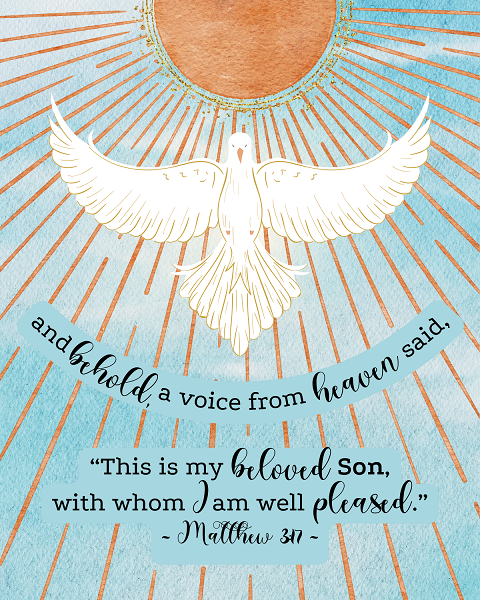Readings: Isaiah 42:1-7 | 1 Corinthians 1:26-31 | Matthew 3:13-17
Text: Matthew 3:13-17

Who is Jesus? That’s one of the questions that comes up when we consider the Baptism of Our Lord. Where can we look for an answer? To men? As the dialogue in Mark 8 with the disciples showed, even during His earthly life, there was misunderstanding and disagreement about who He is and what He’s up to. That’s why we, who are called by His Name some two millennia later, need to continually be reminded who Jesus is.
The Name, Jesus, was given to Him at His circumcision (Luke 2:21). It was given with the shedding of His blood. The Name, “The Lord saves” does not come without the shedding of the blood of God’s Son.
God’s Son was placed under the Law, as we heard last week:
“4But when the fullness of time had come, God sent forth his Son, born of woman, born under the law, 5to redeem those who were under the law, so that we might receive adoption as sons. 6And because you are sons, God has sent the Spirit of his Son into our hearts, crying, “Abba! Father!” 7So you are no longer a slave, but a son, and if a son, then an heir through God.” (Galatians 4:4–7)

Under the Law, He became subject to everything we are—every bit of suffering both just and unjust—even though He was without sin and He was under no compulsion to do so. This is foundational to who Jesus is.
Likewise at His Baptism. Reason tells us He had no reason to be there. “I need to be baptized by You and do You come to me?” What is the sinless God-Man doing submitting to a baptism where they are confessing their sins? Just as at His circumcision, He received the mark of the covenant permanently on His body, at His Baptism, He is permanently marked—anointed by the Holy Spirit. He is set apart for God’s purpose.
The Baptism is where Jesus received the title, Christ: the Anointed One. It’s the anointing of the Holy Spirit, for the very work He had come to do: The Lord saves His people from their sins (Matt. 1:23).
He came as Prophet, through whom the Word of God came and is, and who still speaks to us in His Word today (which is why we stand for the Holy Gospel). “I will raise up for them a prophet like you from among their brothers. And I will put my words in his mouth, and he shall speak to them all that I command him.” (Deuteronomy 18:18)
He came to be the Priest, who stands in that water of sinners because He is the one chosen to make the sin offering for the whole world. As St. Paul says, “For there is one God, and there is one mediator between God and men, the man Christ Jesus, 6 who gave himself as a ransom for all, which is the testimony given at the proper time.” (1 Timothy 2:5-6) And for our sakes, “we do not have a high priest who is unable to sympathize with our weaknesses, but one who in every respect has been tempted as we are, yet without sin. 16 Let us then with confidence draw near to the throne of grace, that we may receive mercy and find grace to help in time of need.” (Hebrews 4:15-16)
Finally, He is anointed to be the King. He rules over a Kingdom which is not of this world (John 18:36). But His Kingdom does bring deliverance to her citizens. For us, Scripture describes what this King does for us: “He has delivered us from the domain of darkness and transferred us to the kingdom of his beloved Son, 14 in whom we have redemption, the forgiveness of sins.” (Colossians 1:13-14)
And if all of that isn’t clear enough in the title of Christ, God the Father adds His clear voice to the scene at the Jordan: “Behold! A voice from heaven said, ‘This is my beloved Son, with whom I am well pleased.’” In this declaration, it shows that Jesus is not simply a functionary—an underling sent to do the dirty work. This reminds us of the hymn, “He sent no angel to our race, of higher or of lower place, but wore the robe of human frame, and to this world Himself He came.” (LSB 544, “O Love, How Deep” v. 2) God is personally invested in reaching each one of us, seeking our eternal salvation!

His Circumcision and Baptism were not just for Him. They are a sermon to us: The Lord Saves. Jesus is the Christ and the Son of God. “At the end of eight days, when he was circumcised, he was called Jesus, the name given by the angel before he was conceived in the womb.” (Luke 2:21) There God is…in the womb just as we once were, just as all people are. But there is God sanctifying the womb, making it a holy dwelling for His life-giving work. At His circumcision, there the Son of God is again, as a newborn, recently covered in vernix and blood and mucus. But here, He sheds His first blood and bears the mark of God’s promise: “So shall my covenant be in your flesh an everlasting covenant…and in you all the families of the earth shall be blessed.” (Genesis 17:13; 12:3).
Likewise, His Baptism wasn’t just a show for one day. It was a teaching for us who were to come. It cannot be that we are saved simply by knowing about certain truths about God. James says that even the demons know truths about God, but this causes them to shudder [James 2:19]. It preaches a reality to us, by which we might also be called sons of God. Hear it once more:
“16 And when Jesus was baptized, immediately he went up from the water, and behold, the heavens were opened to him, and he saw the Spirit of God descending like a dove and coming to rest on him; 17 and behold, a voice from heaven said, ‘This is my beloved Son, with whom I am well pleased.’”

Certainly Adam would have been considered a son of God, but he and His bride forsook their position. They and their offspring became enemies of God, brutal rebels out to prove their place by their own way. This whole course was a dead end…a deadly end, in fact. Until Jesus was revealed—in the womb of Mary, in the arms of His mother and father, in the waters of the Jordan. He made His place with sinners, with whom He shared flesh and blood. There in flesh and blood, in the water with sinners, God the Father, Creator of Heaven and Earth, declared from heaven: “This is my beloved Son, with whom I am well pleased.” In the water, and in the Spirit, He declared this through His Son who shares our flesh.
He also has come to you at your Baptism. There, you were permanently marked as His own, witnessing God’s covenant with His Church. There you too were marked with His most holy Name. God the Father marked you with His Name! Bathed in the cleansing water and blood from His pierced side, you were given your personal name and placed into Jesus! And there, in the font, He brought you forgiveness, rescue, and the promise of eternal salvation!
And receiving this Name means a complete change for each of us—even if it took place many years ago in time, or we don’t remember it. At your Baptism, in the waters of Lebanon (or in my case, Piedmont, California), the heavens opened for you and the Holy Spirit was given to you, and the God the Father said about you—in Christ—”you are my beloved son, with whom I am well pleased.” All of this is wrapped up in being called “Christian,” and this is why we call on God as our true Father, and we are indeed His true children.
In the Name + of Jesus. Amen.









